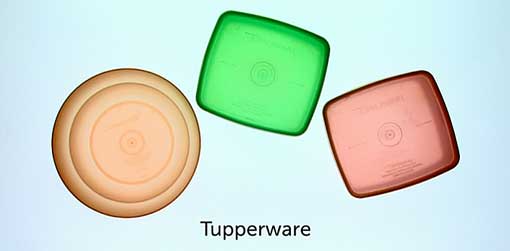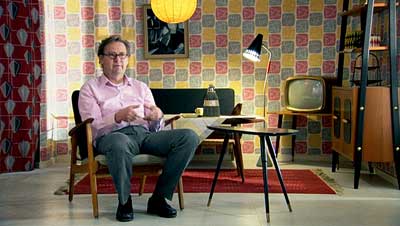
Have you ever contemplated a stack of Tupperware and suddenly seen the genius of the modern movement?
No?
Well, the 2010 BBC series The Genius of Design is now out on DVD with five episodes spanning the bulk of the modern movement in design. It's a fun, educational romp through the marketplace, mass production, consumerism -- and yes, the invention of the once revolutionary and now uber-dull plastic Tupperware.
This series (broadcast last year on the Smithsonian Channel and now available on Acorn DVD) takes a broad look at the growth of modern design since the Bauhaus, the venerable inter-arts and design school founded in Germany before the second World War. Purged by the Nazi party in the late 1930s, most of the founders emigrated to America and Britain.
And what a story it is. The beginning is the consumer revolt against Henry Ford and the Model T, when the assembly line titan misjudges the market, thinking everyone remains happy with the same little black car. He's late meeting growing demand for design variety, and after a strong 10-year run, Ford sales begin to dwindle almost overnight.

From there, it's an entertaining kaleidoscope of chairs, telephones, locomotives and teapots that span the war, the colorful optimism of the '50s and '60s, and the elitist designer '80s. Eventually we come to our own particular phase of affordable, flat-packed IKEA items -- mass produced, environmentally conscious consumerism. (Original IKEA line shown here, from around 1950.
In episode four, "Better Living Through Chemistry," we arrive at the genius of mono-block lawn chairs -- the forebears of the trendy Phillipe Starck clear plastic chairs. As the show reminds us, the expanding and then rampaging use of plastic was forward-looking and exciting -- a colorful wake-up from of the ruins of postwar Europe.

And our little friend Tupperware, once a revelation, soon faded into the everyday cultural background with other consumer plastics. As the critic Roland Barthes is quoted, it was the "first magical substance that consented to be banal." And eventually, as the writers point out, the mono-block chair became "the Zelig of the design world . . . wherever you look, there it is, from Buckingham Palace to Baghdad."

There are some great moments in The Genius of Design, where you realize the reach of designers into the most regular corners of our lives, such as the piece on the tabletop telephone by Henry Dreyfuss. Once so pervasive, it was estimated there were over 160 million of them in use. So common, and so well sculpted was this piece, it simply was -- until it fell to the same fate at the Model T, too ubiquitous to maintain its hold.
Director Peter Sweasy and writer Tim Kirby (prior teamed on The Genius of Photography) do a great job weaving all the disparate players and movements into a grand arc, including journeys into the pre-war origins of the Volkswagen Beetle and the postwar Eames plywood chairs. There's also a fascinating segment on another wartime byproduct, Wally Byam's Airstream trailer, "the modern minimalist vision of living it up, in unpainted aluminum."
A plus for architects is a sober look at Le Corbusier's early residential works from the '40s and '50s, restored and looking every bit as shockingly modern as they must have when they were first built.

The Genius of Design is a smart journey through our own mental attics, where old images are stored and modernism -- as a great achievement -- sought to express the best, simplest designs at an economical price for everyone. It shows our greatest, most enduring designs as the ultimate marriage of art, engineering and commerce.
Not a bad legacy for the 20th century, considering.
[At right: Michele De Lucchi with the Memphis Group's Sotsass bookshelf, c. 1981.]
And finally, in the same spirit, GOD leaves us poised for a new achievement: "production processes that actually benefit the environment by either returning benignly into the soil, or get recycled into new products."
The only way there, is by design, of course.